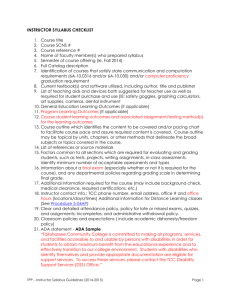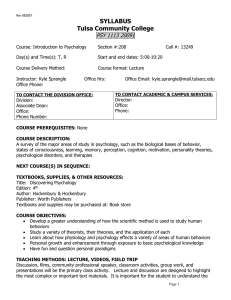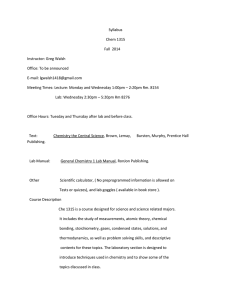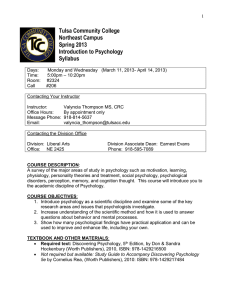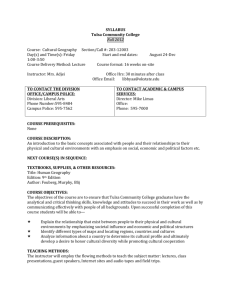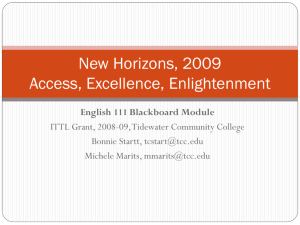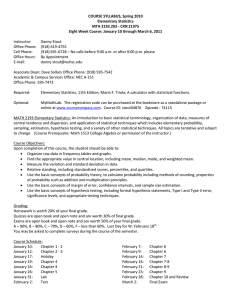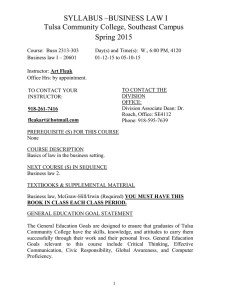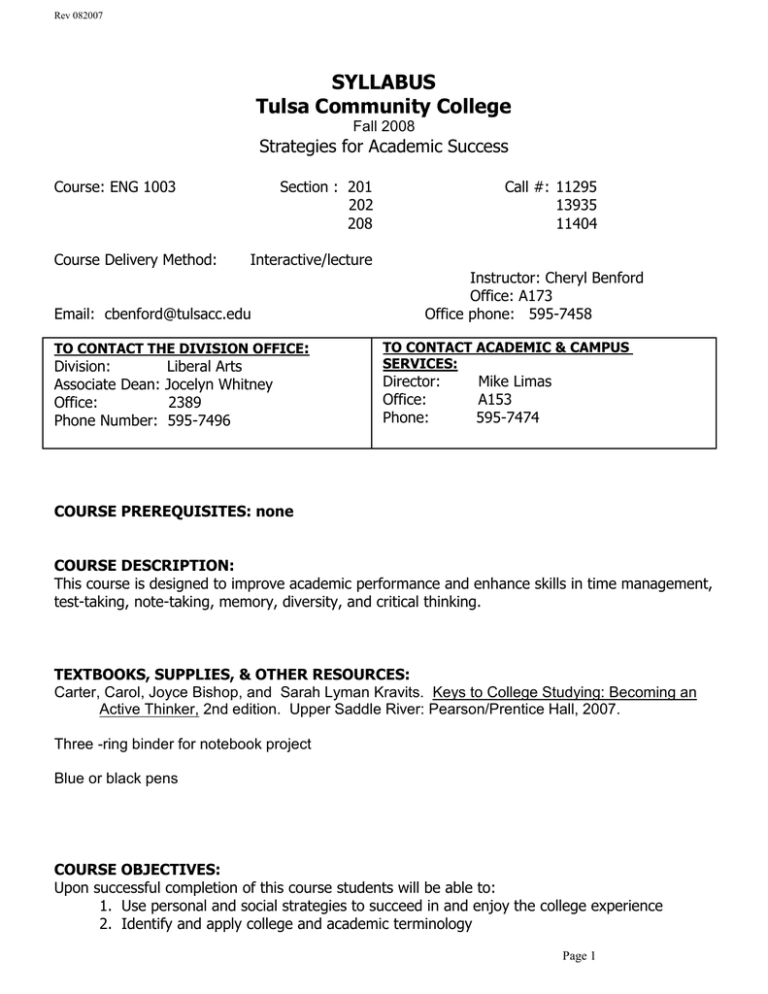
Rev 082007
SYLLABUS
Tulsa Community College
Fall 2008
Strategies for Academic Success
Course: ENG 1003
Course Delivery Method:
Section : 201
202
208
Interactive/lecture
Email: cbenford@tulsacc.edu
TO CONTACT THE DIVISION OFFICE:
Division:
Associate Dean:
Office:
Phone Number:
Call #: 11295
13935
11404
Liberal Arts
Jocelyn Whitney
2389
595-7496
Instructor: Cheryl Benford
Office: A173
Office phone: 595-7458
TO CONTACT ACADEMIC & CAMPUS
SERVICES:
Director:
Office:
Phone:
Mike Limas
A153
595-7474
COURSE PREREQUISITES: none
COURSE DESCRIPTION:
This course is designed to improve academic performance and enhance skills in time management,
test-taking, note-taking, memory, diversity, and critical thinking.
TEXTBOOKS, SUPPLIES, & OTHER RESOURCES:
Carter, Carol, Joyce Bishop, and Sarah Lyman Kravits. Keys to College Studying: Becoming an
Active Thinker, 2nd edition. Upper Saddle River: Pearson/Prentice Hall, 2007.
Three -ring binder for notebook project
Blue or black pens
COURSE OBJECTIVES:
Upon successful completion of this course students will be able to:
1. Use personal and social strategies to succeed in and enjoy the college experience
2. Identify and apply college and academic terminology
Page 1
Rev 082007
3. Construct short and long term goals, balancing skills, interests, personality and values
4. Create and monitor a weekly/monthly time plan to balance work, school, family, and
social activities.
5. Locate and apply college resources and support systems and incorporate these into
learning process (My TCC E-mail, Blackboard, Career Center, Advisement, Financial Aid,
Learning Resource Center, Computer Labs, and Support Labs);
6. Analyze and modify study techniques and behavior patterns to successfully complete
homework, reading assignments, exams, and special projects;
- Demonstrate effective note-taking techniques across the disciplines
- Demonstrate test taking strategies for objective tests, essay exams, and
Oral exams
- Use techniques for improving memory and concentration;
7. Apply critical and creative thinking to identify and solve academic and social problems
(includes math and science strategies, collaborative learning, and conflict resolution);
8. Demonstrate application of basic paragraph and essay organizational techniques using
writing processes and use mechanics of English correctly in written assignments
(i.e. grammar, punctuation, and spelling); and
9. Demonstrate transference of skills learned to other coursework during the semester.
TEACHING METHODS:
Class sessions will include direct teaching, whole group discussion, individual conferences with
instructor, lab work, and small group work. In the small group sessions, students will discuss
reading and course assignments, practice applications of new concepts, and perform critical
thinking exercises. Students are expected to master independent study during the course of the
semester.
EVALUATION TECHNIQUES:
Grading System:
Homework and In-Class Activities 100 points
A = 90 - 100%
Three Chapter Exams
300 points
B = 80 - 89%
Blackboard and MyTCC project
25 points
C = 70 - 79%
Career Center
50 points
D = 60 - 69%
Writing Project
25 points
F = 0 - 59%
Intro to Research/LRC Project
25 points
Notebook Portfolio
100 points
NOTE: NOT ALL HOMEWORK AND IN-CLASS ASSIGNMENTS WILL BE COLLECTED AND GRADED.
THESE ASSIGNMENTS WILL BE CHOSEN AND EVALUATED AT RANDOM INTERVALS FOR CREDIT
AND ARE DUE AT THE BEGINNING OF THE CLASS SESSION. MISSED ASSIGNMENTS AND
EXCERCISES MAY NOT BE MADE UP FOR CREDIT.
ATTENDANCE: It is important to your success as a student to attend class regularly. Coming to
class after the first ten (10) minutes constitutes tardiness. Not only is it a disruption, it shows that
you do not respect other people’s time. You will not be allowed to enter class after this ten minute
window. If you must leave class early, please do so quietly.
Page 2
Rev 082007
LATE ASSIGNMENTS AND MAKE-UP WORK: Students must adhere to all assignment
deadlines and due dates. Any exceptions are at the discretion of the instructor. If a problem
arises, please contact me BEFORE the due date. If an exam is missed, it is up to the student to
contact the instructor by the next class period to schedule the make-up. Make-up exams include
at least one component that is not on the regularly scheduled exam and contains no extra-credit
question. This plan does not include the final exam.
Course Withdrawal: The deadline to withdraw from a course shall not exceed 3/4 the duration
of any class. Contact the Counseling Office at any TCC campus to initiate withdrawal from a course
('W' grade) or to change from Credit to Audit. Check the TCC Academic Calendar for deadlines.
Students who stop participating in the course and fail to withdraw may receive a course grade of
“F,” which may have financial aid consequences for the student.
COMMUNICATIONS:
Email: All TCC students receive a designated “MyTCC” email address (ex:
jane.doe@mail.tulsacc.edu). All communications to you about TCC and course
assignments will be sent to your MyTCC email address; and you must use MyTCC email
to send email to, and receive email from, the instructor regarding this course.
Inclement Weather: TCC rarely closes. If extreme weather conditions or emergency situations
arise, TCC always gives cancellation notices to radio and television stations.
This information is also posted on the TCC website (www.tulsacc.edu).
GENERAL EDUCATION GOALS: General Education courses at TCC ensure that our graduates
gain skills, knowledge, and abilities that comprise a common foundation for their higher education
and a backdrop for their work and personal lives. TCC ’s General Education goals are: Critical
Thinking, Effective Communication, Engaged Learning, and Technological Proficiency.
CLASSROOM ETIQUETTE: Open and mutually respectful communication of varied opinions,
beliefs, and perspectives during classroom discussion encourages the free exchange of ideas that
is essential to higher learning and to the ability to learn from each other. Please follow the
following guidelines to insure that everyone in the class experiences a successful and productive
semester in this class:
1. You are expected to abide by the rules and regulations set forth in the Student Code
Handbook, which may be downloaded from the TCC Student Web.
2. Keep cell phones and pagers turned off during class sessions. No textmessaging during class sessions.
3. Coming to class after the first ten (10) minutes constitutes tardiness. Not only is it a
disruption, it shows that you do not respect other people’s time. You will not be allowed
to enter class after this ten minute window. If you must leave class early, please do so
quietly.
4. During small group sessions, treat participants with respect and consideration.
Page 3
Rev 082007
Comments should be directly related to group topics and not directed at members of
the group.
5. Questions concerning a grade on an assignment or your standing in the course may be
handled by scheduling an appointment with me after class. Please do not introduce
the topic during class time or minutes before the class begins.
6. If you need to contact me personally, you may email me or call me. If you call after
4:00 p.m., I will respond the first thing the next morning.
SYLLABUS CHANGES: Occasionally, changes to the syllabus may be necessary. Students will
be notified of any changes to the syllabus in writing, usually through announcements in
Blackboard.
STUDENTS WITH DISABILITIES: TCC provides accommodations for qualifying students in
compliance with the Americans with Disabilities Act. For information, students may contact the
disabled Student Resource Center, 918-595-7115, or the Resource Center for the Deaf and Hard of
Hearing, 918-595-7428V, 918-595-7434TTY.
ACADEMIC DISHONESTY: Academic dishonesty (cheating) is defined as the deception of
others about one’s own work or about the work of another. Academic dishonesty or misconduct is
not condoned or tolerated at campuses within the Tulsa Community College system. Tulsa
Community College adopts a policy delegating certain forms of authority for disciplinary action to
the faculty. Such disciplinary actions delegated to the faculty include, but are not limited to, the
dismissal of disrespectful or disorderly students from classes.
In the case of academic dishonesty a faculty member may:
Require the student to redo an assignment or test, or require the student to complete a
substitute assignment or test;
Record a "zero" for the assignment or test in question;
Recommend to the student that the student withdraw from the class, or administratively
withdraw the student from the class;
Record a grade of "F" for the student at the end of the semester. Faculty may request that
disciplinary action be taken against a student at the administrative level by submitting such a
request to the Dean of Student Services.
INSTITUTIONAL STATEMENT: Each student is responsible for being aware of the
information contained in the TCC Catalog, the TCC Student Policies & Resources Handbook,
and semester information listed in the class schedule. All information may be viewed on the
TCC website: www.tulsacc.edu
Statement of Agreement: Each student should sign an agreement which will be kept on file for the
duration of the semester.
Strategies for Academic Success
Page 4
Rev 082007
Week
In Class
Key: R=Reading; A= Activity; W= Writing; L= Lecture; Q= Quiz/Test
Assignment
1
Course Introduction:
Syllabus/Agenda/Goals
Getting Acquainted
Preview textbook
R= Preface and pp. 1-13
A= Take inventory, p.9
2
Intro to TCC Campus
College Terminology
L= Introduction to Goal Setting
and Time Management
Organizing Notebook
A= Writing Goals (handout)
Daily Schedule (handout)
Ex. pp.27-29
R= Ch.1, pp.14-26
3
Notebook Check
Time Management (cont’d)
R= Ch.1
A= LASSI Assessment
4
Learning Styles Inventory
Personality Spectrum
Goal Setting (cont’d)
R= Ch 2
A= Learning Styles Groups
W= Design a Self Portrait!(55)
5
Cope/Crisis Plan
Studying Textbooks and
Reading
R= Ch 4 (121)
Ch 5 (155)
Review Ch 1 and 2
6
Reading and Studying:
Selecting Main Ideas and SQ3R
Listening and Memory
Using TCC Technology:
Blackboard, TCC e-mail,
Student Web
Q= Ch 1 and 2
A= Listening Exercise
Memory Story
R= Ch 6
Review Ch 4 and 5
7
Test Taking
Managing Test Anxiety
Learn strategies for test
preparation
R= Ch.10 and 11
A= Test Taking Tips
Ch 6 Reflections
Q= Ch 4 and 5
8
Self Assessments
Revisiting Short/Long Term
Goals
Review for Midterm
Test: Chapters 1,2,5,6,10 & 11
9
L=Taking Notes from Lectures
R=Ch 7
A= Note taking Exercise
10
Writing Effectively
R=Ch 8
A= Communication Activity
11
Careers & College Majors
A= Outside Research
Career Planning
Resumes, Interviewing, Job
Search
Quantitative Learning
Critical and Creative Thinking
A=Outside Research continued
14
Moving Forward
R= Ch 12
A=Reading Exercise
15
Review Goals
Portfolios Due
16
Review Test Taking Skills
12
13
R=Ch 3 and Ch 9
A=
Page 5
Rev 082007
17
Final Exam
Page 6


